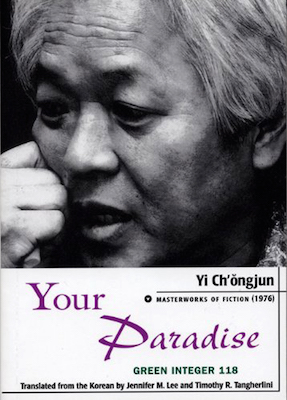While I’ve been messing around trying to post the Explorer’s Guide To Translated Literature here, missing deadlines, Korean authors and translators have continued to work together to pump out great Korean works of fiction now available in English. Today I’ll discuss three works that have recently come to attention: Yi Chong-Jun’s Your Paradise, Bang Hyeong-Seok’s collection Time To Eat Lobster, and a collection of work by female authors, The Future of Silence.
Your Paradise (translated by Jennifer M. Lee and Timothy R. Tangherlini) is a fact-based tragi-comic story of a leper colony on Sorokdo Island undergoing a change of leadership. A new director named Jo arrives overflowing with “brilliant” plans, but the patients see all such efforts as self-aggrandizing attempts to build a “statue.” The patients’ long history of grievances around this issue goes as far back as Japanese colonization. Jo struggles to bring the islanders around to his vision, initially involving an amusing set piece with the island soccer team. As in most Korean literature, though, even as reins are being taken in hand, they begin to works themselves loose.
In addition to the putative tale, Yi actually considers the role of power on the ruled and the ruler, clearly drawing parallels between the leper colony and the Korea of the 1960s. in which individual desire was sacrificed in the name of a “good” defined by leaders. The ending includes a clever bit of writing which reveals certain motivations to have been more complicated than initially apparent. Even after his retirement, Jo remains on the island ostensibly to demonstrate his permanent commitment to the lepers, but in some ways he still seems to be working on his “statue.” This level of writing (and translating!), plot, and clever reflection on Korean history takes its place with Yi Mun-yol’s Our Twisted Hero and Pilon’s Pig among the great Korean allegorical works on power.
Time To Eat Lobster takes on Bang Hyeong-Seok’s consistent theme of oppression of the working class, previously explored in Off to Battle at Dawn, but in an international setting: he extends the idea of worker to “foreign” workers, both in Korea and overseas, particularly with respect to Vietnam. The stories honestly portray non-Korean cultures: the Vietnamese characters are uniformly well-drawn and Bang gives them extremely convincing and well-outlined back-stories that give meaning their beliefs and actions. When conflicts arise, they do so out of very different histories and cultural understandings. Several of the Vietnamese protagonists are Viet Cong who fought against Korean troops during the Vietnamese War, adding yet another layer of complication.
The longest piece of this well-plotted, written, and translated (by Seung-Hee Jeon) collection is the title story, a Korean bestseller in 2003, which ties together threads of bad Korean management behavior, the legacy of the Vietnam War, inter-cultural relationships, and Kŏnsŏk, the narrator merely (and desperately) trying to keep everything together. Tensions based on military history and the economic authority the Koreans hold over the Vietnamese are made worse by the fact that Korea seems ready to replay its historical errors in Vietnam by doing something similar in Iraq.
At the outset of Korean modern literature, female writers were few, far between, and usually marginalized. But as the Korean alphabet hangul and universal education spread, so has the number of female writers, who may well now comprise over fifty percent of Korean authors. To cover some of this outpouring of female fiction, Bruce and Ju-Chan Fulton have translated The Future of Silence, a collection of women’s short stories which introduces readers to key authors of the late modern period from the venerated Park Wan-suh to recent additions to the canon such as Kim Sagwa. In general, The Future of Silence is an excellent introduction to post-civil-war female fiction in Korea. The nine stories also demonstrate shifts in subject matter and style over time as the stories have moved from topics of political and military to social and economic separation.
Seven of the stories, Park Wan-suh’s “Identical Apartments,” O Chon-hui’s “Wayfarer,” Kim Sagwa’s “It’s One of Those the-more-I’m-in-Motion-the-Weirder-it-Gets Days, and It’s Really Blowing My Mind,” Kim Chi-won’s “Almaden,” and Cheon Un-yeong’s delightful “Ali Skips Rope” examine various forms of alienation in Korean society. Kong Seon-ok contributes “The Flowering of Our Lives,” a story of unlikely allies dealing with their problematic lives with soju and sisterhood. Kim Ae-ran’s extremely modernist “The Future of Silence” celebrates the “vitality and dynamism” seemingly departing from the modern world.
The two other stories, Han Yujoo’s “It Ain’t Necessarily So” and So Young-en’s “Dear Distant Love,” are less vital, the former a bit of a post-modern muddle, and the latter a bit too traditional. (Regular readers of Korean literature should be aware that The Future of Silence contains six stories already published in Wayfarer: New Fiction by Korean Women.) These three books are all “good reads” — all of the writing is good, and the translations range from solid to excellent — and together they demonstrate the wide range of topics and styles of Korean fiction currently being translated into English.
Related Korea Blog posts:
The Triumph of Han Kang and the Rise of Women’s Writing in Korea
Charles Montgomery is an ex-resident of Seoul where he lived for seven years teaching in the English, Literature, and Translation Department at Dongguk University. You can read more from Charles Montgomery on translated Korean literature here, on Twitter @ktlit, or on Facebook.


